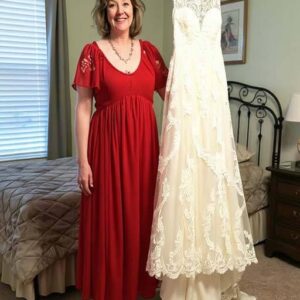When my sister named her newborn son Martin, just like mine, I brushed it off as a strange coincidence. But weeks later, after our mother’s sudden death and the shocking reading of her will, I realized Emily had a plan all along — and it began with that name.
The corridor outside the delivery room smelled like disinfectant and something else — something older, heavier.
It reminded me of fear that had been sitting around too long. The chairs were hard, plastic, and cold even through my coat.
I sat beside Jake, my sister’s husband. Our knees nearly touched, but it felt like we were sitting miles apart.
He kept rubbing his palms on his jeans, over and over, like he could wipe away whatever thoughts he was trying not to think.
“No screams… maybe things went well?” I asked, trying to keep my voice light. I offered a small smile, but it just hung in the air like a question no one wanted to answer.
“Or maybe the opposite,” he said without looking at me, his voice flat. His eyes were stuck to the floor like he was afraid to look up and see something he couldn’t handle.
I looked around. The hallway was quiet — a cart rolled by in the distance, one of those metal ones with rattling wheels.
I wanted to talk — about the weather, the vending machine that only gave Diet Coke, anything to break the tension.
But Jake wasn’t in the mood. He looked like a man on the edge of something deep and cold.
Just then, the door creaked open. A nurse with kind eyes and tired shoulders poked her head out.
“You can come in.”
Jake and I stood at the same time, but I reached the door first. Inside, everything was too white — the lights, the sheets, even the walls. Machines beeped softly, blinking like quiet little heartbeats.
And there she was. Emily.
My sister looked like someone who had been to war and back. Her face was pale, lips dry and cracked.
Her eyes had dark circles like she hadn’t slept in a week. But she was smiling, and in her arms was the tiniest thing I’d ever seen — pink, wrinkled, and alive.
The baby squirmed softly in her arms, making those little newborn noises, half sighs, half squeaks.
Jake gasped and leaned on the wall. His face went pale, and I worried he might hit the floor. I placed a hand on his back and gently nudged him toward a chair.
“Men,” I said with a smirk, trying to lift the mood. “Built like trucks, faint like feathers.”
Emily laughed softly as if pushing it out had taken everything she had. She tilted the bundle so I could see him better.
My heart clenched. He was beautiful. Small and perfect. A new life, right there in her arms.
“He’s beautiful,” I whispered.
Emily nodded slowly. “His name is Martin.”
I blinked. The air changed — like a breeze had just run through a still room.
“Martin?” I asked. “You mean…?”
“Yes,” she said.
“Something wrong, sister?” she asked, eyes fixed on me.
“You know my son is named Martin.”
Emily shrugged. “Lots of boys are named Martin. It’s not like you copyrighted it.”
I hesitated. “It’s just… surprising.”
“Take it as a compliment. I liked your choice,” she said.
I forced a smile. My jaw felt tight.
“Alright then,” I said. “I’ll grab you some fruit from the store later.”
She nodded again. We exchanged a look I couldn’t name. It wasn’t warm, yet it wasn’t cold either. But it sat between us like a stone.
Something behind her smile didn’t feel like admiration.
Weeks passed like lazy river water — slow, murky, and uneventful. The days felt heavy, one slipping into the next without much to mark them.
Emily and I barely saw each other. We’d send the occasional text, sometimes a photo of the babies, but that was it. I figured it was the newborn fog.
I remembered how hard those first months could be — the sleepless nights, the nonstop crying, the way time melted like butter on a hot stove.
Still, something about the way Emily sounded during our last phone call stuck with me. It sat in my chest like a stone I couldn’t shake.
Her voice had been sharp and rushed like she was trying not to cry or scream. I hadn’t asked. Maybe I should have.
Emily lived with our Mom. She was 84, and in the last few years, she had faded a little. Her steps were slower, and her thoughts wandered.
She was still sharp sometimes, especially when talking about old stories or giving opinions no one asked for.
But most days, she was more memory than muscle. I figured Emily had help around the house.
But help, I’ve learned, can feel like a ghost when no one talks about the truth. And in our family, truth often sat behind closed doors with dust on it.
Then came the night. I had just tucked in my Martin, kissed his forehead, and closed his bedroom door.
I stood in the kitchen with a mug of tea that had gone cold. The clock blinked 10:47 p.m.
My phone rang.
I smiled, confused. “Calling me at this hour, Em? What’s the drama?”
Her voice came through the line, soft and low. “Mom’s gone.”
I stood up so fast my chair scraped the floor. “What?”
“She passed in her sleep. The nurse said it was peaceful.”
My eyes filled with tears. “Emily… I—”
“I know,” she whispered. “I should’ve called sooner. But I just… couldn’t.”
When the call ended, the silence in the kitchen felt thick. I stared at the clock again and wished I could turn it back.
I hated myself for every visit I had pushed off, for every call I didn’t make.
The living room smelled like cedar and forgotten holidays. That scent — part wood, part dust, and part memory — pulled me straight back to Christmas mornings and birthday cakes on the old dining table.
But now the house was too quiet. No laughter.
No clinking dishes. Just the soft creak of the couch springs as Emily and I sat side by side, stiff and still.
We hadn’t spoken much that morning. I poured her coffee. She barely touched it. I offered a toast.
She shook her head. Now, we sat on Mom’s flower-print couch, the same one that had faded with time but still felt too cheerful for a day like this.
We looked like two girls waiting for bad news from the principal’s office.
Across from us, Mr. Howard, Mom’s attorney, adjusted his glasses and opened a thick folder.
His suit was too big, or maybe his shoulders had shrunk with years of doing this sort of thing — sitting with families, reading words that pulled the ground out from under people.
He cleared his throat. “Your mother left a will.”
Emily folded her hands in her lap. I tried not to fidget, but my foot kept tapping.
“Most of her assets — jewelry, savings, her car — are to be split between the two of you.”
I gave a small nod. That part didn’t surprise me. Mom always said she wanted to be fair.
“But the house,” he continued, “is to go to her grandson. Martin.”
My lips curled into a smile. My heart softened just a little. “She always said that. Said it should stay with the first grandchild.”
But then, I felt Emily shift beside me. It wasn’t just a casual move. It was stiff, like a warning. Her voice cut through the quiet. “Which Martin?”
I turned to her, shocked. “What?”
“There are two Martins now,” she said, her voice tight. “She never said which one.”
Mr. Howard frowned, flipping the page. “There’s no clarification. Just ‘to my grandson, Martin.’” He held up the handwritten will. “No middle name. No birthdate.”
“She meant my Martin,” I said, my voice louder than I meant it to be. “The one she helped raise while Emily was off traveling the country chasing yoga retreats and new diets.”
Emily’s jaw tightened. “She lived with me too. Especially in her final months. You weren’t there for that.”
Mr. Howard held up his hand. “Let me finish. The date on this will is from a month after your son’s birth, Emily. So it’s legally possible she meant either child.”
I felt my chest tighten. “You named him Martin for this, didn’t you?” I turned toward her, my voice shaking. “That’s why. You knew this would happen.”
Her face turned red. “Don’t be ridiculous.”




